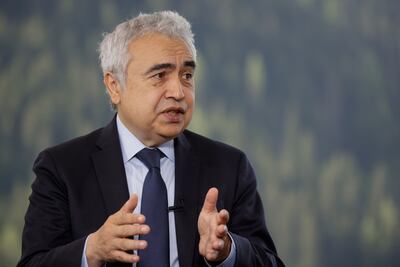Middle East countries “can play, and some of them are playing, a critical role at this point” in the effort to mitigate global warming and accelerate the path to net-zero carbon emissions, the US envoy for climate change said in Davos.
Countries in the region are engaged in the effort to develop renewable energy capacity around the world, John Kerry, special presidential envoy for climate, said at a press conference on the sidelines of the World Economic Forum annual meeting on Tuesday.
“The UAE, for instance, has a very large solar deployment. They are exploring rapidly green hydrogen … and they are investing in other countries and helping with their transitions,” said Mr Kerry.
“India is a prime example where you have a [2030 renewable energy] commitment by Prime Minister [Narendra] Modi, which is 500 gigawatts … which is very significant.”
The Regional Dialogue for Climate Action was also held in Abu Dhabi in April 2021, and was critical for building momentum before Cop26 in Glasgow late last year. Cop27 will be held in Egypt this year and the UAE will host Cop28 in 2023.
“The UAE stepped up and hosted the first-ever Middle East climate conference, which had 11 countries come together, a group of them oil and gas producers. And they all signed on to an extremely forward-leaning communique, which they are now pursuing,” said Mr Kerry.
“So, I think that any oil-producing country that begins to step up and indicate their acceptance of the reality of the need to build up for a transition is a critical message to the rest of the world. And the UAE and other countries in the region have done that, and are doing that,” said Mr Kerry.
The UAE, Jordan and Israel signed an agreement in November to develop a renewable energy and desalination plant in the Hashemite kingdom to mitigate climate change and add to the growth of clean energy in the country.
“So, we just announced the project 'Prosperity', which is a combination of Jordan, the UAE and Israel building solar power output that will feed into Israel, while Israel is going to help produce a major desalinisation plant capacity for Jordan,” Mr Kerry said.
“And there is a synergy in that, not to mention that it helps build a foundation for countries to begin to think about each other and work with each other very differently from past history.”
The flaring of natural gas continues to be a problem in the region and results in the release of methane, a significant contributor to global warming, he said.
“Ending flaring, in Iraq, for instance, other countries, flare still and vent. That is a real challenge because methane is so much more destructive than [carbon dioxide], we must stop those practices. And, obviously, plug the leaks of methane that are occurring into many parts of the world. Russia has a particularly heavy leakage challenge,” Mr Kerry said.
However, in the short-term, oil producers in the Middle East could help alleviate the impact of the energy crisis being felt worldwide, he said.
“Obviously, it would help to have some greater [oil and gas] production at this point in time in order to deal with some of the challenges of inflation and rise of price, particularly on gas for a lot of citizens around the world,” Mr Kerry said.

International Energy Agency executive director Fatih Birol said Russia's invasion of Ukraine had led to “a major energy crisis”.
“This is the first global energy crisis. We had the oil price crises of 1970s. But now, we have major problems in terms of oil, in terms of natural gas, in terms of coal,” Mr Birol said at the conference on Tuesday.
“Russia … was only a few weeks ago, number one oil exporter of the world, number one natural gas exporter of the world and the major player in the coal markets.”
Turmoil in markets, high prices and inflation are all giving “signals of recession” in some countries. Some countries have responded to meet the fall in supply “understandably”, he said.
Mr Birol said these temporary measures risk going beyond what is currently needed and could undermine efforts to control global warming.
Mr Kerry also stressed that the issue of energy supplies lost in Europe because of the Ukraine conflict should not be a distraction from the climate emergency and what is required to meet global goals.
“We should not allow a false narrative to be created, that what has happened in Ukraine, somehow, obviates the need to continue forward, and to accelerate even what we are trying to do to address the crisis of climate,” said Mr Kerry.
He pointed out that carbon dioxide emissions have gone up by 6 per cent while coal use has increased by 9 per cent in the last year.
“We can meet the crisis of Ukraine and the energy crisis of Europe, and still deal, as we must, with the climate crisis," he said.














